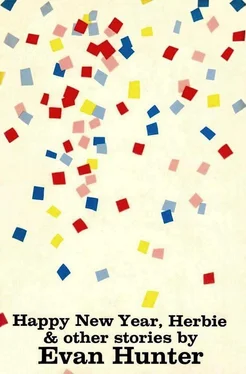“Got two of ’em,” Mr. Donald said. “One’s a spare. Got that one over in the ship.”
“The what?” I asked.
“Why, the ship. The one I went up with,” Mr. Donald explained. “Had to have a ship, you know.”
“Sure,” John said, nodding. “He had to have a ship, Bert.”
“Yes, of course.”
“I was saving that ’til last,” Mr. Donald said. “That’s Exhibit R.”
“R?”
“Oh, sure, I got lots more to show you.”
He started to show us, and the photographers had a field day. By the time he finished, there were more mineral and rock specimens on my desk than in the Geology Department of the Museum of Natural History. He claimed he’d got them all on the moon. He also claimed that some of the minerals were compounds peculiar to the moon’s airless, waterless nature. He left with a crowd of reporters behind him, while John and I desperately called in the scientists who had volunteered to examine the loot.
John clapped me on the shoulder and said, “We’re in this to the end, Bert. Together.”
“I appreciate that, old man,” I told him.
I thought I saw a tear in John’s eye, but I wasn’t sure.
There were tears in mine, though, when the scientists delivered their reports.
Their spokesman sniffed the air like a beagle and then announced, “There can be no question. We have seen no specimens such as these on earth. Coupled with the photographs Mr. Donald was good enough to—”
“The what? What? What did you say?”
“Photographs,” the spokesman said. “The ones Mr. Donald took on the moon. He was good enough to send them to us directly. Figured they’d help us reach a fair decision. Unquestionably valid, too. Our most powerful telescopes could never have got such close-ups. Coupled with these photographs, as I was saying, there can be no reasonable doubt that Mr. Donald has indeed been to the moon.” The spokesman cleared his throat. “We... ah... have a suggestion to make, Mr. Merrian.”
“What’s that?”
“Pay the man his million dollars.”
Mr. Donald saved the spaceship for last. We insisted on seeing that privately, without the invasion of the press. He agreed because he was closer to the million dollars now. Besides, he wanted to put away the space suit and the assorted items that had served as exhibits. When he’d done that, hanging the space suit alongside the spare in a locker, and stowing the specimens, he showed us around the control room. “Only one of its kind in the world,” he said proudly. “Took me twenty years to build it. Ain’t another like it.”
“It looks complicated,” I said.
“Ain’t,” Mr. Donald answered. “Simplest thing in the world. Built an orbit calculator right into it, you see. Only wanted it to take me one place, and that was the moon. So all I got to do is set the year and the day of the month with these knobs here, and it automatically figures just where the moon is, and what the orbit to take the ship there would have to be. Then all I do is press that there firing stud, and the thing just goes up.” He lifted his forefinger. “Right to the moon.”
“It was easy then,” John said.
“Easy as pie. Be just as easy to get to all the planets with this baby. Anyone could figure it.”
“Well,” I said, “I guess he gets the million bucks.”
“I guess so,” John agreed wearily.
“We’d better get back to the office, John. If you’ll contact us tomorrow, Mr. Donald, we’ll have your check waiting for you.”
“You’re sure now?”
“Oh, yes,” I said. I grinned feebly. “Why not? You’ve convinced us.”
Mr. Donald seemed happy now. He led us out of the control room and down the ramp. The rocket site was deserted, and blackness covered the sky as we walked toward the company’s automobile.
“Sure lonely out here,” John said.
“Has to be,” Mr. Donald answered. “Blast-off, you know. Can’t have people injured by the jet trail.”
“Naturally not,” I said.
“Uhm,” John agreed.
We rode back to the city in silence.
At the office Mr. Donald stepped out of the car. “Hope you fellows have that check tomorrow,” he said. “I aim to make another trip up there. Figure maybe I’ll hop to Mars from the moon. Need supplies, though. Plenty. Part of the check will go for that.”
“What about fuel?” John asked.
“Oh, got my tanks full already. I can make that next trip soon as I get the money to stock up.”
I thought of the $21,456.31 in our paltry bank account, and I wondered how much supplies that would buy for Mr. Donald. John looked at me, and I knew he was thinking the same thing.
“Well, good night, Mr. Donald,” I said.
“Night, fellas. See you tomorrow.”
“Sure,” John called after him.
John’s eyes met mine for an instant, and we grinned at each other.
“But are we doing the right thing?” John asked two days later.
“Have we got a million bucks?”
“After the spending we did? Hell, we’re lucky if we have a thousand.”
“Then we’re doing the right thing,” I said simply.
“I guess so.”
“When in doubt, run.”
“Suppose he catches up.”
“Never,” I said. “He’s an old man, more or less. Besides, we can go to a great many places.”
“And we can always start another magazine,” John said hopefully. “Somewhere.”
“Sure. Nothing to worry about.”
We sat back in the seats and stretched luxuriously.
There was a hold full of supplies, and tanks full of fuel, and Mr. Donald’s space ship handled like a dream.
We sat back and watched the stars and the approaching moon.
We were living on North Brother Island at the time.
It was, and is, a tiny island in the middle of the East River, adjacent to a miniscule uninhabited island called South Brother. When we lived there, and I suppose the same is true of it now, the Riker’s Island prison was visible in the distance from one end of the island, and from the opposite end, the Bronx mainland. There was a lot of river traffic passing North Brother. From our windows in one of the converted buildings we could see tugs and barges and transports and tankers and once even a Swedish luxury liner.
The buildings we lived in had once been part of a hospital for tuberculars, the hospital rooms converted into apartments shortly after the war. When Joan and I were first married, we lived in McCloskey Hall, which was on the end of the island opposite the tennis courts and the handball court and a sort of outdoor teahouse overlooking the edge of the river and Hell’s Gate on the horizon. Later, just before our first son was born, we applied for and moved to a larger apartment on the other end of the island in a building called Finley Hall. If all of the buildings sounded like part of a college campus, it was with good reason. The island had initially been leased by Columbia, N.Y.U., and Fordham, I think, and was euphemistically called Riverside Campus or Riverside Extension or some such, the idea being to provide housing for World War II veterans who were attending these colleges. The unmarried students lived in a dormitory in the center of the island, the old administration building. The married veterans and their wives lived in the converted hospital buildings. Later, the accommodations were extended to include veterans from other colleges in the city and, toward the end, the island accepted veterans who were attending any school approved by the Veterans Administration — which is how Herbie came to live on North Brother. I say “toward the end” not because the island went up in smoke or anything like that, but simply because the buildings eventually reverted to what they’d been originally: a hospital. In the old days, before the students invaded it, the island had housed such medical phenomena as Typhoid Mary. After we left, it became the Riverside Hospital for drug addicts. We, the interim students, were only a part of its brief, non-medical history.
Читать дальше












